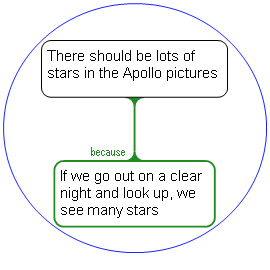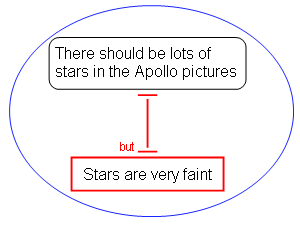
 |
|
|
|
|
| 1.4 Simple Arguments | |
A simple argument is just a contention with a single reason for it, OR a contention with a single objection to it.
Here are two simple arguments:
| Examples |
 |
The simple argument is the whole structure (reason AND contention). |
 |
This is another simple argument, made up of an objection to a contention. Notice that the contention happens to be the same as in the first example; for more on this see Tutorial 3. |
| Discussion |
Note that all you need for a simple argument is a single piece of evidence bearing upon a single contention. You don't need both a reason and an objection. In other words, a simple argument is not a debate; it is just an elementary piece of reasoning.
"Simple" doesn't mean small, short or obvious. A simple argument might be quite technical or hard to understand. What makes an argument simple is that it has just one contention and one piece of evidence.
This is important because the simple argument is the basic unit of all reasoning. All arguments, no matter how complex, are made up of simple arguments hooked up together. This will become more clear in Tutorials 3 and 4.
| New Concepts |
A simple argument is just a contention with a single piece of reason for it, or a contention with a single objection to it.
| Glossary | Contents | |
|
Copyright © Austhink 2003-2006 |
|
Last updated 20-Feb-2007